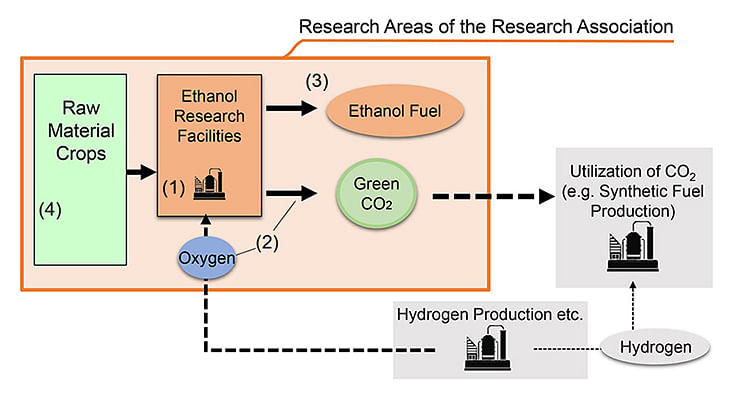Mazda joins Japanese consortium for biomass-based next-gen auto fuels
Mazda becomes seventh member of the Research Association of Biomass Innovation for Next Generation Automobile Fuels which include ENEOS, Suzuki, Subaru, Daihatsu, Toyota and Toyota Tsusho
Mazda Motor Corporation has joined the Research Association of Biomass Innovation for Next Generation Automobile Fuels (Research Association’), taking the membership to seven participating companies, all of them Japanese.
The Research Association was established on July 1, 2022 to study ways to optimise the process of producing fuel. The six members at the time were ENEOS Corporation, Suzuki Motor Corporation, Subaru Corporation, Daihatsu Motor Co, Toyota Motor Corporation, and Toyota Tsusho Corporation.
The research consortium promotes technological research on the use of biomass, as well as the efficient production of bioethanol fuel for automobiles through the optimised circulation of hydrogen, oxygen, and CO2 during production to achieve a carbon-neutral society.
Hiroyuki Yamashita, Senior Principal Engineer responsible for technological research at Mazda, said, "Through the Research Association, we will work together with other member companies to promote R&D on production technology for bioethanol fuel and other technologies. We will make every effort to increase the potential of carbon neutral fuels, a promising option for achieving a carbon neutral society."
Koichi Nakata, Chairman of the Board of the Research Association of Biomass Innovation for Next Generation Automobile Fuels, stated, "Carbon neutral fuels are a leading energy option for realising a carbon neutral society. We are delighted that Mazda, which has accumulated considerable knowledge and technology relating to carbon neutral fuels, has become our new partner. The Research Association will further promote research on production technology for bioethanol fuel and the use of CO2 generated during that process."
 As per the Research Association, it is crucial to provide diverse energy options to meet the needs of many different regions and customers in order to achieve carbon neutrality. Hydrogen and synthetic fuels based on electricity from renewable energy sources, as well as bioethanol fuel able to reduce CO2 emissions through photosynthesis in plants are promising options, and their effectiveness has been confirmed by the Intergovernmental Panel on Climate Change (IPCC). However, it is essential to clarify the issues and search for a solution regarding CO2 emission reduction and social implementation throughout the manufacturing process, in addition to raw material procurement for any of these fuels.
As per the Research Association, it is crucial to provide diverse energy options to meet the needs of many different regions and customers in order to achieve carbon neutrality. Hydrogen and synthetic fuels based on electricity from renewable energy sources, as well as bioethanol fuel able to reduce CO2 emissions through photosynthesis in plants are promising options, and their effectiveness has been confirmed by the Intergovernmental Panel on Climate Change (IPCC). However, it is essential to clarify the issues and search for a solution regarding CO2 emission reduction and social implementation throughout the manufacturing process, in addition to raw material procurement for any of these fuels.
The specific research areas are as follows.
Research on efficient ethanol production systems: With the aim of improving production technology for second-generation bioethanol fuel that does not compete with food, the Research Association will design, install, and operate production facilities, identify issues with production, research solutions and study ways to improve the efficiency of production systems.
Research on byproduct oxygen, CO2 capture, and utilisation: The Research Association will study how to use the high concentration of oxygen generated as a byproduct during hydrogen production as well as the CO2 generated during bioethanol fuel production.
Research on efficient operation of the overall system, including fuel utilisation: The Research Association will investigate the issues involved with using bioethanol fuel obtained in to automobiles and other vehicles and explore solutions. It will also study model formulas that can make predictions of both raw material cultivation production volumes and fuel production volumes.
Research on efficient raw material crop cultivation methods: The Research Organization will develop a system that proposes optimal cultivation methods for maximizing yield and optimizing crop components to secure raw materials for bioethanol fuels. It will aim to improve the accuracy of crop yield productions through soil composition surveys and other methods.
ALSO READ:
Toyota Kirloskar Motor partners Indian Sugar Mills Association to accelerate ethanol use in India
Analysis: What’s behind India’s rising ethanol confidence?
Biofuels can be the pathway to carbon-neutrality: experts at SIAM conference
RELATED ARTICLES
Autoliv Plans JV for Advanced Safety Electronics With China’s HSAE
The new joint venture, which is to be located strategically near Shanghai and close to several existing Autoliv sites in...
JLR to Restart Production Over a Month After September Hacking
Manufacturing operations at the Tata Group-owned British luxury car and SUV manufacturer were shut down following a cybe...
BYD UK Sales Jump 880% in September to 11,271 units
Sales record sets the UK apart as the largest international market for BYD outside of China for the first time. The Seal...






 By Autocar Professional Bureau
By Autocar Professional Bureau
 29 Mar 2023
29 Mar 2023
 4332 Views
4332 Views





 Ajit Dalvi
Ajit Dalvi




